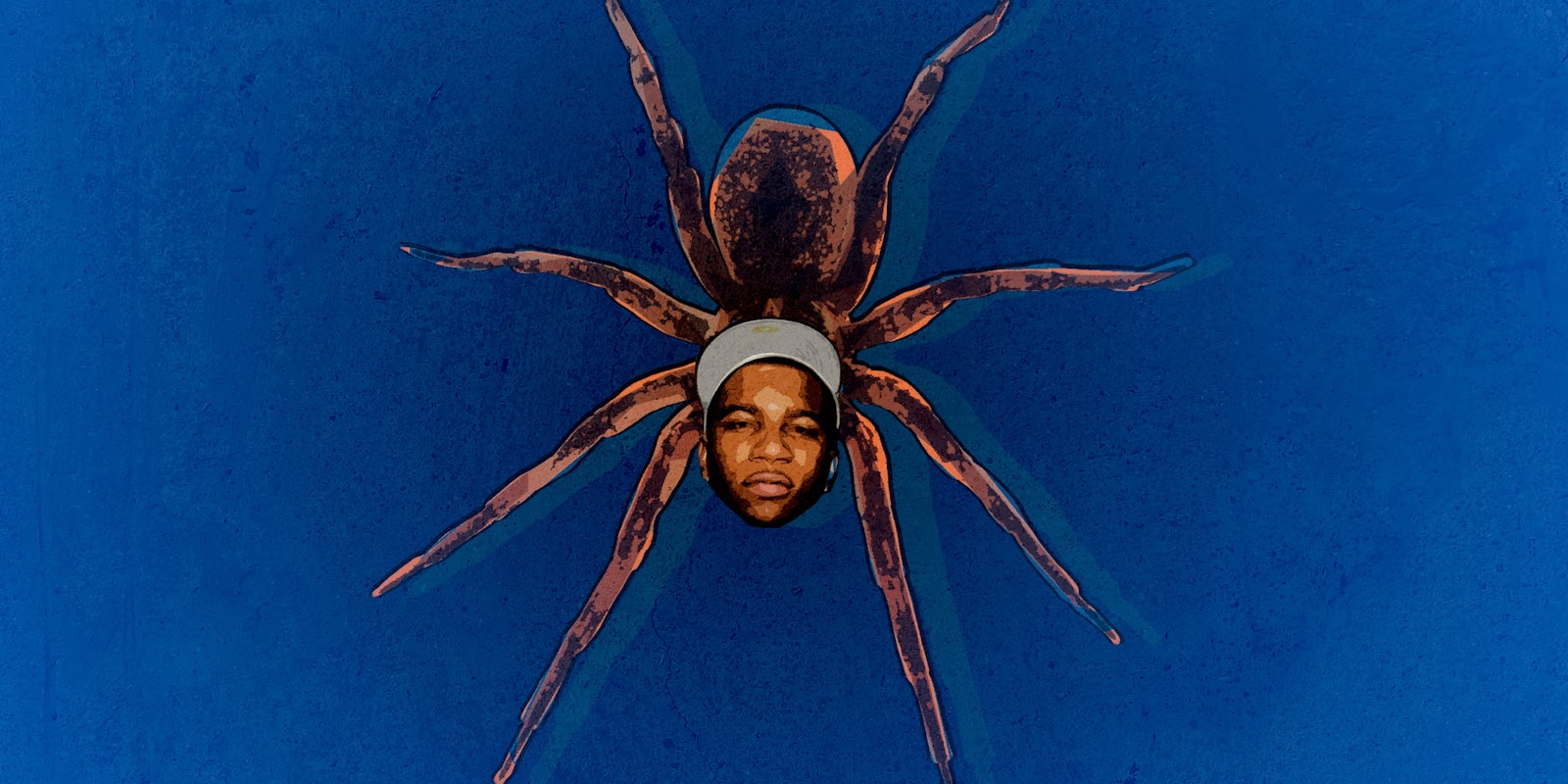American rapper and Bay Area treasure Lil B the Based God loves spiders—and tweeting about them. He’s definitely got some naturalist tendencies, as his own observations of spiders suggest something researchers recently learned: Some species of spiders can remember locations and things.
In a text message conversation with the Daily Dot, Lil B said he’s always been interested in spiders, as well as insects and birds.
“But I’m around a lot of spiders recently so I have been observing them and collecting mental data,” he wrote.
So we thought we’d check his tweets against what some arachnologists (people who study spiders and their eight-legged cousins, including ticks and mites) think. Here’s what they said.
From my recent observations of local insects I can tell that spiders grow very fast! There is a small spider I have been watching – Lil B
— Lil B THE BASEDGOD (@LILBTHEBASEDGOD) May 30, 2016
“Yes, many spiders do grow very quickly, especially when prey are abundant,” Catherine Scott, a Ph.D. student studying spiders at the University of Toronto told the Daily Dot in an email. (She and the other arachnologists we spoke with were very quick to point out that spiders are not insects.)
Sam Evans, a Ph.D. student at the University of British Columbia, emailed the Daily Dot some additional thoughts on spider growth:
Spiders grow in spurts, by molting–that is a spider periodically sheds its exoskeleton. How fast a spider grows depends on a lot of factors. Most spiders molt between five and ten times during their lives, and larger species tend to go through more molts than do smaller species. Depending on the species, a spider can go from an egg to adulthood in as little as two or three months, or as long as two years or more. Males of a species often reach adulthood faster than females; in black widows, males often reach adulthood in half the time it takes females to mature. Growth also depends on how much food the spider is able to eat, and the climate of its environment (warmer temperatures typically facilitate faster growth). Finally, molting is often tiresome and dangerous for spiders. During molting the spider is unable to escape from predators, and afterwards its new exoskeleton can take hours or days to harden. Spiders can also lose one or more legs, or even die, during molting.
God bless anyone I no who has been bittin by a brown recluse spider or a house spider. Def respect to the insect parasite victems – Lil B
— Lil B THE BASEDGOD (@LILBTHEBASEDGOD) March 5, 2012
“Brown recluse spider bites can have serious consequences, but most bites are not severe,” Scott said. “The terrible necrotic lesions you hear about in the news and when you search online for ‘brown recluse spider bite’ are the rare, severe cases, not the typical cases. Most brown recluse bites heal just fine with no medical intervention and minimal scarring.”
She noted that the only other North American spiders besides recluse spiders that have venom that is harmful to human are the widow spiders. But house and hobo spiders don’t bite and don’t harm humans.
Spiders don’t usually bite humans, she said, because they don’t have a reason to. Humans are not their prey, and if they do bite it’s usually defensively.
“Again, spiders are not insects, nor are they parasites!” Scott said.
The symtptoms to no if uv been bttin by a posionus spider is yo will bleed from the ass and more. That’s just one of symptoms – Lil B
— Lil B THE BASEDGOD (@LILBTHEBASEDGOD) March 5, 2012
“Anal bleeding is not a symptom of any spider bite that I’m aware of. That’s a new myth for me,” Scott said.
“If bitten by poisonous spider, you will not ‘bleed from the ass and more.’ (I don’t know how he came up with that one!),” Jerome Rovner, an arachnologist from Ohio University, wrote in an email.
Evans didn’t comment on that tweet.
Have you felt a spiderweb lately? They are very strong and it makes you think spiders are up to something very cool – Lil B
— Lil B THE BASEDGOD (@LILBTHEBASEDGOD) June 5, 2016
“Some spider webs, like those of black widows, are indeed extremely strong,” Scott said. “Scientists are trying to figure out how to synthesize black widow silk, and in the future, this material could be used to make things like super thin bullet-proof vests.” She added a link to evidence that black widow spider threads can be plucked like guitar strings without breaking.
Evans noted that the spider with the “strongest silk known to science” is the Darwin’s Bark Spider. Their webs are also huge—up to 80 square feet, he said, sometimes spanning entire rivers.
if uv been bittin by a posionus spider or not the non posion bite marks have a lota lil tetth, posions 1s have 2big bite marks +teeh – Lil B
— Lil B THE BASEDGOD (@LILBTHEBASEDGOD) March 5, 2012
Scott noted that venom and poison are different: Animals inject venom through bites or other special organs, but they only secrete poison (which is toxic when absorbed through the skin or gut).
“All spiders, with the exception of those in two families, are venomous; they use venom to subdue their prey,” she said. “All spiders spiders have a pair of mouthparts, called chelicerae, tipped with fangs. However, it is impossible to diagnose a spider bite just by looking at the puncture marks.” Even many physicians misdiagnose cuts and infections as spider bites because they see this sort of marking. In reality, Scott said, the fangs are so close together you wouldn’t be able to see them.
“Although he’s a great entertainer, Lil B is not a scientist,” Rovner said. He acknowledged that some of his statements on spiders were accurate, but many were not. So perhaps you should take his spider tweets the same way you enjoy his music: as great entertainment.


